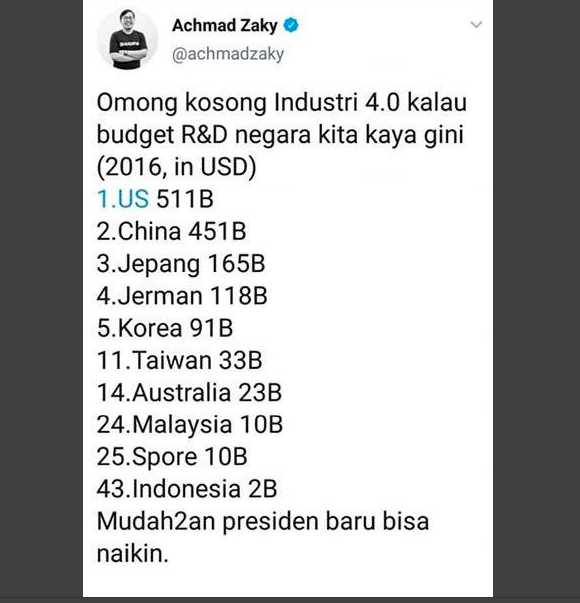When you’re a famous entrepreneur, getting political on social media can hurt your business and reputation. At least that’s what’s happening to the CEO of Indonesian e-commerce unicorn Bukalapak, Achmad Zaky. With one tweet from his personal account, Zaky triggered an online protest movement urging people to uninstall the Bukalapak app.
It’s not the first time a tech startup has become a political talking point in Indonesia, nor will it likely be the last. The leaders of Indonesia’s unicorns have, alongside skyrocketing valuations, also amassed considerable fame and influence in the country.
The controversial tweet on February 13 was considered to be cornering the Indonesian President, Joko Widodo, who is running for a second term in the upcoming presidential election.

In the tweet, Zaky complains about the research and development (R&D) budget in Indonesia, which he says is very low compared to other countries. Then came the shocker:
Zaky tweeted that he hopes “the new president can do better.” By using the term ‘new president’, Zaky was seen to be speaking out in favour of Joko Widodo’s challenger.
The criticism and calls to boycott and uninstall Bukalapak mostly come from pro-Widodo supporters. #UninstallBukalapak has been a trending topic on Twitter in Indonesia since then, based on Trends24 data.
Critics were attacking Zaky for using his popularity to make what they saw as a clearly political statement, others were pointing out that the president had just paid Bukalapak a favour by speaking at its anniversary event. Yet others claimed Zaky’s data was wrong, and that R&D budgets had actually improved since Joko Widodo took office nearly five years ago.
Responding to the chaos caused by his tweet, Achmad Zaky issued a public apology. “I, Achmad Zaky, as a person and as one of the founders of Bukalapak, express my sincere apologies for the statement I made on social media. I am very sorry for the mistake of my unwise actions.”
Zaky said that his speech did not intend to support or not support any particular presidential candidate, but an invitation to develop Indonesia together through scientific research and development.
Zaky and Joko Widodo are said to have met a few days after the controversial tweet to smooth the waves.
Not the first case: #UninstallTraveloka
While this was perhaps the most dramatic of such cases so far, it’s not the first time tech startup CEOs and political figures have gone head-t0-head.
Two years ago, travel unicorn Traveloka experienced a similar backlash when the platform’s co-founder and former CTO Derianto Kusuma allegedly expressed his disapproval of Jakarta’s newly elected governor Anies Baswedan. When the controversial governor delivered a speech, several people walked out. Some news circulating after the incident claimed that Kusuma had been among those who walked out, or that he shook the hand of the instigator of the walkout.
Traveloka later clarified that this was entirely untrue and that Kusuma was not even present at the event.
But similar to what happened to Bukalapak, #UninstallTraveloka was a trending topic on Twitter for several days in November 2017 until the company clarified the incident.
When it comes to political campaigns in Indonesia, social media is an essential and effective tool to steer and reinforce public talking points, especially with the younger generation.
According to data from the National Statistics Bureau (BPS), about 80 million people under the age of 40 will be eligible to vote next year, making up nearly half of the electorate.
It’s not just tech CEOs who have come under fire for allegedly expressing their political viewpoints; so-called social media “shitstorms” can also form the other way round.
Prabowo Subianto has had several experiences with social media blunders, one of which was his controversial statement about online motorcycle taxi drivers like those people working in ride-hailing networks like Go-Jek and Grab.
In his campaign last year, Subianto expressed concern over the fact that many high school graduates opted to be drivers for ride-hailing platforms, rather than continue their education. To him, this condition is alarming and needs to be fixed. This statement triggered many complaints, especially from those who oppose Subianto and his allies.
Go-Jek responded to this statement and stated that online motorcycle taxi drivers who are partners of Go-Jek are micro-entrepreneurs that should be supported, not looked down upon. “Their contribution to the development of the Indonesian economy is quite large,” Go-Jek’s VP of corporate affairs Michael Say said as quoted by local media.
Expected to stay neutral
Social media observer Denny Siregar believes that startup’s founders are seen as influencers and role models, especially among the young generation in the digital era today. The public expects them to remain neutral and impartial during the political season.
“As a CEO, Achmad Zaky should not need to be involved in a current high-voltage political situation like this. He must be neutral, like Nadiem Makarim and other startup founders. Focusing on his work and not on political campaigns. Delivering criticism is okay, but there’s no need to use words like ‘new president’ because it is sensitive and offensive to a particular party,” said Siregar on his Facebook page.
(Correction: An earlier version of the story did not give the full chronology of events leading to the Uninstall Traveloka case, and did not mention that CTO Derianto Kusuma was not present during the governor’s speech. We revised the 12th paragraph according to Traveloka’s official statement.)
